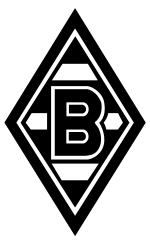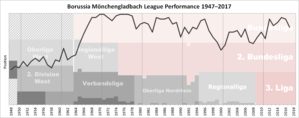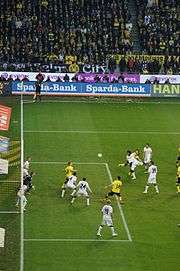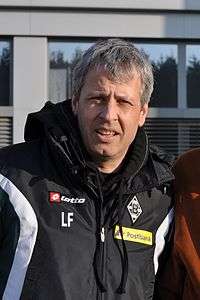Borussia Mönchengladbach
 | |||
| Full name |
Borussia VfL 1900 Mönchengladbach e.V. | ||
|---|---|---|---|
| Nickname(s) |
Die Fohlen (The Foals) Die Borussen (The Borussians) | ||
| Founded | 1 August 1900 | ||
| Ground | Stadion im Borussia-Park | ||
| Capacity | 54,057 | ||
| President | Rolf Königs | ||
| Head coach | Dieter Hecking | ||
| League | Bundesliga | ||
| 2017–18 | 9th | ||
| Website | Club website | ||
|
| |||
Borussia VfL 1900 Mönchengladbach e.V., commonly known as Borussia Mönchengladbach (pronounced [boˈʁʊsi̯aː mœnçn̩ˈɡlatbax]),[1][2] Mönchengladbach or Gladbach, is a German football club in Mönchengladbach, North Rhine-Westphalia. Founded in 1900, Borussia Mönchengladbach play in the Bundesliga, the top tier of the German football league system, making their first appearance in the league during the 1965–66 season. Subsequently, the club became one of Germany's best-known, best-supported, and most successful teams, winning the Bundesliga five times during the 1970s,[3] as well as two UEFA Cup titles in 1975 and 1979 and reaching a European Cup final in 1977.
Since 2004, Borussia Mönchengladbach have played at the 54,057 capacity Borussia-Park, having previously played at the smaller Bökelbergstadion since 1919. Borussia-Park is famous for its "Nordkurve" (or North stand), a single-tiered stand. Borussia Mönchengladbach has over 75,000 members as of April 2016 and is the fifth largest club in Germany.[4] Their main rivals are 1. FC Köln, against whom they compete in the Rheinland Derby.[5]
"Borussia" is a Latinized form of Prussia, a popular term for German clubs in the former Kingdom of Prussia. The club's nickname is Die Fohlen [diː ˈfoːlən] ("The Foals"), coined in the 1970s due to having a young team with a fast, aggressive playing style. They also frequently refer to themselves as Die Fohlenelf ("The Foals' Eleven"), a nickname displayed on their shirts. The official mascot of the club is the foal Jünter. In October 2016, they briefly adopted the nickname A German Team after a Scottish pub failed to spell the club's full name on a board advertising a Champions League game against Celtic.[6]
History
Formation
Borussia Mönchengladbach was formed as FC Borussia in 1900 in the Eicken district of Mönchengladbach. The name "Borussia" derives from the Latinized form of Prussia, the kingdom in which the city of Mönchengladbach was situated from 1815. By 1912, Die Borussen found itself in the Verbandsliga, at the time the highest division the club could play in.
In March 1914, the club purchased De Kull, the ground on which the Bökelbergstadion would be built. The First World War halted the progress of both the stadium and FC Borussia, but by late 1917 the team had begun to play games once more. In 1919, FC Borussia merged with another local club, Turnverein Germania 1889, becoming 1899 VfTuR M.Gladbach. The club achieved its first major success in 1920, defeating Kölner BC 3–1 to win the Westdeutsche Meisterschaft final.
The union between Germania and Borussia only lasted a matter of two years; the club was thereafter known as Borussia VfL 1900 e.V. M.Gladbach.[7]
1933–1945: Football under the Third Reich
Following the rise of the Nazi Party to power in 1933, the German league system was reformed to consist of 16 Gauligen – Gladbach found themselves playing first in the Gauliga Niederrhein, and later in various Bezirksklassen (district leagues). Also while under the Third Reich, Mönchengladbach's first ever international player was capped; Heinz Ditgens playing in a 9–0 win over Luxembourg for Germany in the 1936 Olympic Games. After the outbreak of World War II, play continued as usual, other than for the 1944–45 season.
Post War until 1959

Eventually, Mönchengladbach resumed play in June 1946, gaining successive promotions to the Landesliga Niederrhein (the regional second tier) in 1949 and the top flight, the Oberliga West, in 1950. Following many years of promotions and relegations, Borussia won their first Oberliga title in the 1958–59 season.
Ascent to the Bundesliga
| Seasons 1959–60 – 1964–65 | |||||
|---|---|---|---|---|---|
| Season | Position | Goals For | Goals Against | Points | Average Attendance |
| Oberliga West 1959–60 | 14 | 27 | 33 | 38 | 16,134 |
| Oberliga West 1960–61 | 6 | 31 | 29 | 58 | 22,400 |
| Oberliga West 1961–62 | 13 | 21 | 39 | 42 | 13,543 |
| Oberliga West 1962–63]] | 11 | 24 | 36 | 44 | 11,200 |
| Regionalliga West 1963–64 | 8 | 41 | 35 | 71 | 12,000 |
| Regionalliga West 1964–65 | 1 | 52 | 16 | 92 | 22,334 |
| gold: promotion to the Bundesliga as Champions | |||||
In August 1960, Borussia Mönchengladbach defeated 1. FC Köln in the West German Cup. Weeks later, the club won the DFB-Pokal, clinching their first national honours after defeating Karlsruher SC 3–2 in the final. The following year, the club took on the now-familiar name Borussia VfL Mönchengladbach after the city of München-Gladbach became Mönchengladbach. However, further honours would have to wait a decade. Borussia's results in the ten years leading up to the formation of the Bundesliga in 1963 were not strong enough to earn them admission into the ranks of the nation's new top flight professional league, and so the club played in the second tier, the Regionalliga West.
Mönchengladbach enjoyed its first taste of the Bundesliga in the 1965–66 season, earning promotion alongside future powerhouse Bayern Munich. The two clubs would go on to engage in a fierce struggle as they challenged each other for domestic supremacy throughout the 1970s. Bayern took first blood in the struggle for supremacy between the two: winning the Bundesliga championship in 1969. Mönchengladbach struck back immediately in the next season with a championship of their own and followed up with a second title in 1971, becoming the first Bundesliga club ever to successfully defend their title.
1970s: Borussia's golden decade
| Seasons 1969–70 – 1979–80 | |||||
|---|---|---|---|---|---|
| Season | Position | Goals For | Goals Against | Points | Average Attendance |
| 1969–70 | First | 71 | 29 | 51 | 25,645 |
| 1970–71 | First | 77 | 35 | 50 | 21,706 |
| 1971–72 | Third | 82 | 40 | 43 | 16,294 |
| 1972–73 | Fifth | 82 | 61 | 39 | 14,912 |
| 1973–74 | Second | 93 | 52 | 48 | 22,265 |
| 1974–75 | First | 86 | 40 | 50 | 22,150 |
| 1975–76 | First | 66 | 37 | 45 | 23,647 |
| 1976–77 | First | 58 | 34 | 44 | 25,135 |
| 1977–78 | Second | 86 | 44 | 48 | 26,059 |
| 1978–79 | Tenth | 50 | 53 | 32 | 20,129 |
| 1979–80 | Seventh | 61 | 60 | 36 | 17,655 |
| in green: winning the Bundesliga | |||||
Bayern Munich then became the first club to win three consecutive titles, with Borussia finishing only a point behind the champions in 1974. Die Fohlen were able to take some consolation in a 2–1 victory over 1. FC Köln in 1973 to win their second DFB-Pokal. Under coach Hennes Weisweiler, the young side displayed an offensive-minded philosophy and powerful play that attracted fans from all over Germany. The team stayed on the attack and matched Bayern's achievement with three consecutive titles of their own from 1975 to 1977. Mönchengladbach lost the 1977 final of the European Cup to Liverpool, but also made four appearances in the UEFA Cup with wins in 1975 and 1979 against losses in 1973 and 1980. The club's spectacular run had come to an end with eight trophies to their credit, and although they would continue to be competitive for many years, success would be much harder to come by.[3]
1980 and beyond

Mönchengladbach's golden era ended in the 1980s as the club had to sell many of its best players to keep its finances in order, and without talented coaches like Hennes Weisweiler and Udo Lattek, it was not possible to compete with Bayern Munich. Even so, they managed to finish most seasons in the upper half of the league table, and in 1984, Die Fohlen were part of a four way race to the Meisterschale – the Bundesliga championship – finishing one point ahead of Bayern, and tied on points with Hamburger SV and champions VfB Stuttgart, but behind on goal difference. In the same season, Mönchengladbach also lost the DFB-Pokal final to Bayern Munich on penalties, Lothar Matthäus and Norbert Ringels both missing from the spot after the game originally ended all square at 1–1. Matthäus subsequently joined Bayern Munich for a then-record fee of 2.25 million DM, leading some fans to question whether he had deliberately missed his penalty.[8]
The team's performance slipped significantly in the 1990s and Die Fohlen soon found themselves struggling in the lower half of the Bundesliga table. They lost another DFB-Pokal on penalties – this time to Hannover 96 — before winning their most recent trophy to date with a 3–0 DFB-Pokal win over VfL Wolfsburg in 1995. Finally, in 1999, Gladbach were relegated to 2. Bundesliga, where they would spend two seasons. Upon returning to the Bundesliga in 2001, Mönchengladbach remained uninspired as they continued to be mired in the bottom half of the league.
In 2004, Mönchengladbach appointed Dick Advocaat, who had guided the Netherlands national team to the semi-finals of UEFA Euro 2004 and was a successful manager at Rangers, as their new coach. However, Advocaat was unable to turn the team's fortunes and resigned in April of the following year. Former Mönchengladbach player and German international Horst Köppel was appointed caretaker for the remaining five fixtures of the season. Köppel had managed the club's reserves since leaving Borussia Dortmund in June 2004. For the 2006–07 season, legendary Mönchengladbach player and coach Jupp Heynckes was appointed as team coach.
Borussia had taken steps to improve their financial situation with the construction of a new state-of-the-art stadium called Borussia-Park with a permitted capacity of 59,771 spectators (limited to 54,067 for Bundesliga games and to 46,249 for international games). The club had long been hindered by playing in a much smaller and older facility (Bökelberg, capacity 34,500) and with the opening of the new stadium in 2004 can look forward to increased revenues through higher ticket sales and the ability to host lucrative international matches.
On the 31st matchday of the 2006–07 season, Borussia Mönchengladbach were relegated from the Bundesliga after fellow relegation fighters Arminia Bielefeld upset Werder Bremen 3–2 while Mönchengladbach lost 1–0 at home to VfB Stuttgart. They were promoted back to the Bundesliga on the 32nd match-day of the 2007–08 season after winning the match against SV Wehen 3–0.

Under coach Lucien Favre, who took over in January 2011, Borussia Mönchengladbach has in recent years shown ambitions to re-establish themselves in the top regions of the Bundesliga. In the 2010–11 season, after a disastrous first half of the season, Borussia Mönchengladbach managed to narrowly avoid relegation through the post-season relegation play-offs. The following season, 2011–12, followed this up with a strong season in which they were for much of the year in contention for the championship and eventually finished in fourth place. They missed out on qualification to the 2012–13 UEFA Champions League after losing 4–3 on aggregate to Ukrainian club Dynamo Kyiv in the playoff round. During the 2012–13 Bundesliga season, after losing some key players, notably Marco Reus who was voted player of the year in the Bundesliga in the previous season, Borussia Mönchengladbach still contended for the international places until the last match day, eventually finishing in eighth place.
In the 2013–14 Bundesliga season, they had another very successful year, achieving an excellent third-place after the first half of the season and finishing the season in sixth place, entering them into the 2014–15 Europa League competition at the play-off stage. They finished the 2014–15 Bundesliga season in third place, saving the club a place for direct qualification to the 2015–16 UEFA Champions League group stage. The club found itself in a tough group[9] together with Juventus, Manchester City and Sevilla and although they finished bottom of the group, they claimed a respectable points tally of five, claiming draws home and away against Juventus and defeating eventual Europa League winners Sevilla 4–2 at home.
After a poor start to the 2015–16 Bundesliga season, including five defeats, Lucien Favre surprisingly resigned[10] and was replaced with André Schubert as interim coach. The club's fortunes immediately changed, as it won six-straight Bundesliga matches and eventually finishing the season in fourth position, earning qualification to the Champions League for a second successive season.
In the 2016–17 season, Borussia drew a difficult group in the Champions League, but managed to finish in third place above Celtic and qualify for the UEFA Europa League knockout phase. However, after a promising start in the Bundesliga, the club experienced a poor run of form exacerbated by injuries, and had dropped to the 14th position by the winter break. As a result, André Schubert resigned and was replaced by ex-VfL Wolfsburg manager Dieter Hecking. Hecking began with three wins in four Bundesliga matches as Borussia rose to ninth place and also earned a place in the quarter-finals of the DFB-Pokal.
Former head coaches
| Borussia Mönchengladbach coaching history from 1946 to present | |
|---|---|
|
|
Sponsors
| Year | Shirt Sponsor | Branch |
|---|---|---|
| 1976–1980 | Erdgas | Energy/Natural gas |
| 1980–1983 | Datsun | Cars |
| 1983–1990 | Erdgas | Energy/Natural gas |
| 1990–1992 | Tuborg | Brewery |
| 1992–1994 | Trigema | Sportswear |
| 1994–1997 | Diebels | Brewery |
| 1997–2002 | Belinea | Hardware |
| 2002–2005 | Jever | Brewery |
| 2005–2009 | Kyocera | Electronics and ceramics |
| 2009– | Postbank | Retail banking |
Kit Manufacturers
| Year | Kit Manufacturer |
|---|---|
| 1976–1992 | Puma |
| 1992–1995 | Asics |
| 1995–2003 | Reebok |
| 2003–2013 | Lotto |
| 2013–2018 | Kappa |
| 2018– | Puma |
Players
Current squad
- As of 15 August 2018[12]
Note: Flags indicate national team as defined under FIFA eligibility rules. Players may hold more than one non-FIFA nationality.
|
|
Retired numbers
- 12 – the 12th man, dedicated to fans
Loans
Note: Flags indicate national team as defined under FIFA eligibility rules. Players may hold more than one non-FIFA nationality.
|
Coaching and backroom staff
| Role | Nation | Name |
|---|---|---|
| Head coach | Dieter Hecking | |
| Assistant coach | Dirk Bremser | |
| Assistant coach | Frank Geideck | |
| Goalkeeping coach | Uwe Kamps | |
| Team doctor | Dr. Heribert Ditzel | |
| Team doctor and orthopedic surgeon | Dr. Stefan Hertl | |
| Team doctor and orthopedic surgeon | Dr. Stefan Porten | |
| Athletic trainer | Alexander Mouhcine | |
| Physiotherapist | Andreas Bluhm | |
| Physiotherapist | Dirk Müller | |
| Physiotherapist | Adam Szordykowski |
UEFA club rankings
- As of 10 Apr 2018[13]
| Rank | Team | |
|---|---|---|
| 46 | 31.000 | |
| 47 | 30.500 | |
| 48 | 29.500 | |
| 51 | 29.000 | |
| 52 | 28.000 | |
| 53 | 27.500 | |
| 54 | 27.000 | |
Honours
Borussia Mönchengladbach's five Bundesliga championships entitle the club to display two gold stars of the "Verdiente Meistervereine".
Domestic
- Winners: 2007–08
- (Unofficial winners): 1977
European
- Runners-up: 1976–77
International
- Runners-up: 1977
Youth
- Winners: 1981
- Winners: 2009
Double
Records and statistics
Only for Bundesliga
Most appearances
| # | Name | Matches |
|---|---|---|
| 1° | 419 | |
| 2° | 390 | |
| 3° | 366 | |
| 4° | 339 | |
| 5° | 331 | |
| 6° | 321 | |
| 7° | 290 | |
| 8° | 283 | |
| 9° | 274 | |
| 10° | 266 |
Top scorers
| # | Name | Goals |
|---|---|---|
| 1° | 195 | |
| 2° | 97 | |
| 3° | 92 | |
| 4° | 82 | |
| 5° | 81 | |
| 6° | 76 | |
| 7° | 71 | |
| 8° | 61 | |
| 9° | 60 | |
| 10° | 58 |
Players' honours
For a list of every Borussia Mönchengladbach player with 50 or more appearances, see List of Borussia Mönchengladbach players
Players of the club achieved the following honours:
- Player of the Year – Europe
- 1977:

- 1986:

- 1977:
- Player of the Year – Germany
- 1971:

- 1972:

- 1973:

- 1979:

- 1987:

- 2012:

- 1971:
- Player of the Year – Australia
- 1996:

- 1996:
- Player of the Year – Austria
- 1986:

- 1997:

- 1986:
- Player of the Year – Belgium
- 2001:
.svg.png)
- 2001:
- Player of the Year – Denmark
- 1994:

- 1994:
- Player of the Year – Sweden
- 1993:

- 1995:

- 2001:

- 1993:
- Player of the Year – USA
- 1997:

- 1999:

- 2005:

- 1997:
- Bundesliga Top-Scorers
- 1974 – 30 Goals –

- 1975 – 29 Goals –

- 1987 – 24 Goals –

- 1995 – 20 Goals –

- 1974 – 30 Goals –
- Goal of the Year
- 1971:

- 1972:

- 1973:

- 1978:

- 1979:

- 2005:

- 2006:

- 1971:
- Goal of the Season
- 2012–13:

- 2012–13:
References
- ↑ Krech, Eva-Maria; Stock, Eberhard; Hirschfeld, Ursula; Anders, Lutz Christian (2009). Deutsches Aussprachewörterbuch (in German). Berlin: Walter de Gruyter. pp. 383 and 753. ISBN 978-3-11-018202-6.
- ↑ Mangold, Max (2005). Das Aussprachewörterbuch (in German) (6th ed.). Mannheim: Dudenverlag. pp. 212 and 560. ISBN 978-3-411-04066-7.
- 1 2 News – Bundesliga – official website Archived 18 April 2012 at the Wayback Machine.. Bundesliga.de.
- ↑ "Borussia hat jetzt 75.000 Mitglieder". RP Online.
- ↑ "Rhineland derby double interview: Yann Sommer and Timo Horn – bundesliga.com". Retrieved 17 August 2016.
- ↑ A German Team: Borussia Monchengladbach adopt new name BBC Sport. 27 October 2016. Retrieved 24 January 2018.
- ↑ Classic club. FIFA.com.
- ↑ Lothar Matthäus und der Fehlschuss: Gladbachs bitterster Pokal-Moment. Sport.t-online.de.
- ↑ "UEFA Champions League – Standings — UEFA.com". Retrieved 12 October 2015.
- ↑ "Lucien Favre Resigns". Retrieved 20 September 2015.
- ↑ "Borussias Trainer" (in German). borussia.de.
- ↑ "Squad – Borussia Mönchengladbach". borussia.de. Retrieved 4 January 2017.
- ↑ "UEFA 5-year Club Ranking 2018".
Literature
- Holger Jenrich (2007), Das Borussia Mönchengladbach Lexikon (in German), Göttingen: Verlag Die Werkstatt, ISBN 3-89533-585-1
- Holger Jenrich; Markus Aretz (2005), Die Elf vom Niederrhein. 40 Jahre Borussia Mönchengladbach in der Bundesliga (in German), Göttingen: Verlag Die Werkstatt, ISBN 3-89533-503-7
- Werner Jakobs; Rainer Kalb; Markus Aretz (1999), 100 Jahre Borussia Mönchengladbach – Die Borussen-Chronik (in German), Düsseldorf: Verlag Rheinsport networking, ISBN 3-934702-00-7
- Helmut Grashoff; Susanne Grashoff (2005), Meine launische Diva: 30 Jahre mit Borussia Mönchengladbach (in German), Norderstedt: Radtke & Bahr GbR, ISBN 3-00-016918-0
- Markus Aretz; Ingo Rütten (2008), Akte Aufstieg: Borussias Tagebuch der Saison 2007/08 (in German), Göttingen: Verlag Die Werkstatt, ISBN 3-89533-626-2
External links
| Wikimedia Commons has media related to Borussia Mönchengladbach. |